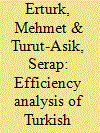|
|
|
Sort Order |
|
|
|
Items / Page
|
|
|
|
|
|
|
| Srl | Item |
| 1 |
ID:
092787


|
|
|
|
|
| Publication |
2009.
|
| Summary/Abstract |
Environmental problems, especially "climate change" due to significant increase in anthropogenic greenhouse gases, have been on the agenda since 1980s. Among the greenhouse gases, carbon dioxide (CO2) is the most important one and is responsible for more than 60% of the greenhouse effect. The objective of this study is to identify the factors that contribute to changes in CO2 emissions for the Turkish economy by utilizing Log Mean Divisia Index (LMDI) method developed by Ang (2005) [Ang, B.W., 2005. The LMDI approach to decomposition analysis: a practical guide. Energy Policy 33, 867-871]. Turkish economy is divided into three aggregated sectors, namely agriculture, industry and services, and energy sources used by these sectors are aggregated into four groups: solid fuels, petroleum, natural gas and electricity. This study covers the period 1970-2006, which enables us to investigate the effects of different macroeconomic policies on carbon dioxide emissions through changes in shares of industries and use of different energy sources. Our analysis shows that the main component that determines the changes in CO2 emissions of the Turkish economy is the economic activity. Even though important changes in the structure of the economy during 1970-2006 period are observed, structure effect is not a significant factor in changes in CO2 emissions, however intensity effect is.
|
|
|
|
|
|
|
|
|
|
|
|
|
|
|
|
| 2 |
ID:
103415


|
|
|
|
|
| Publication |
2011.
|
| Summary/Abstract |
This paper analyzes the performance of 38 Turkish natural gas distribution companies by using a non-parametric method, Data Envelopment Analysis (DEA). The results are used to determine the most proper model specification, to detect the important criteria affecting the efficiency levels, and to find the common characteristics of the most inefficient firms. We find that public firms compared to private firms, non-tender firms compared to tender firms, large firms compared to small firms and firms operating in more developed areas compared to firms operating in underdeveloped areas that utilize resources and manage costs more efficiently. However, we cannot reach a certain conclusion about the comparison of old firms versus the new firms. Lastly, we try to detect the common characteristics of the most inefficient firms and find that most of these firms are immature and low scale companies. Therefore, we think these firms can increase efficiency level either by increasing their delivery amounts through higher penetration rates or by merging or doing both together.
|
|
|
|
|
|
|
|
|
|
|
|
|
|
|
|
|
|
|
|
|